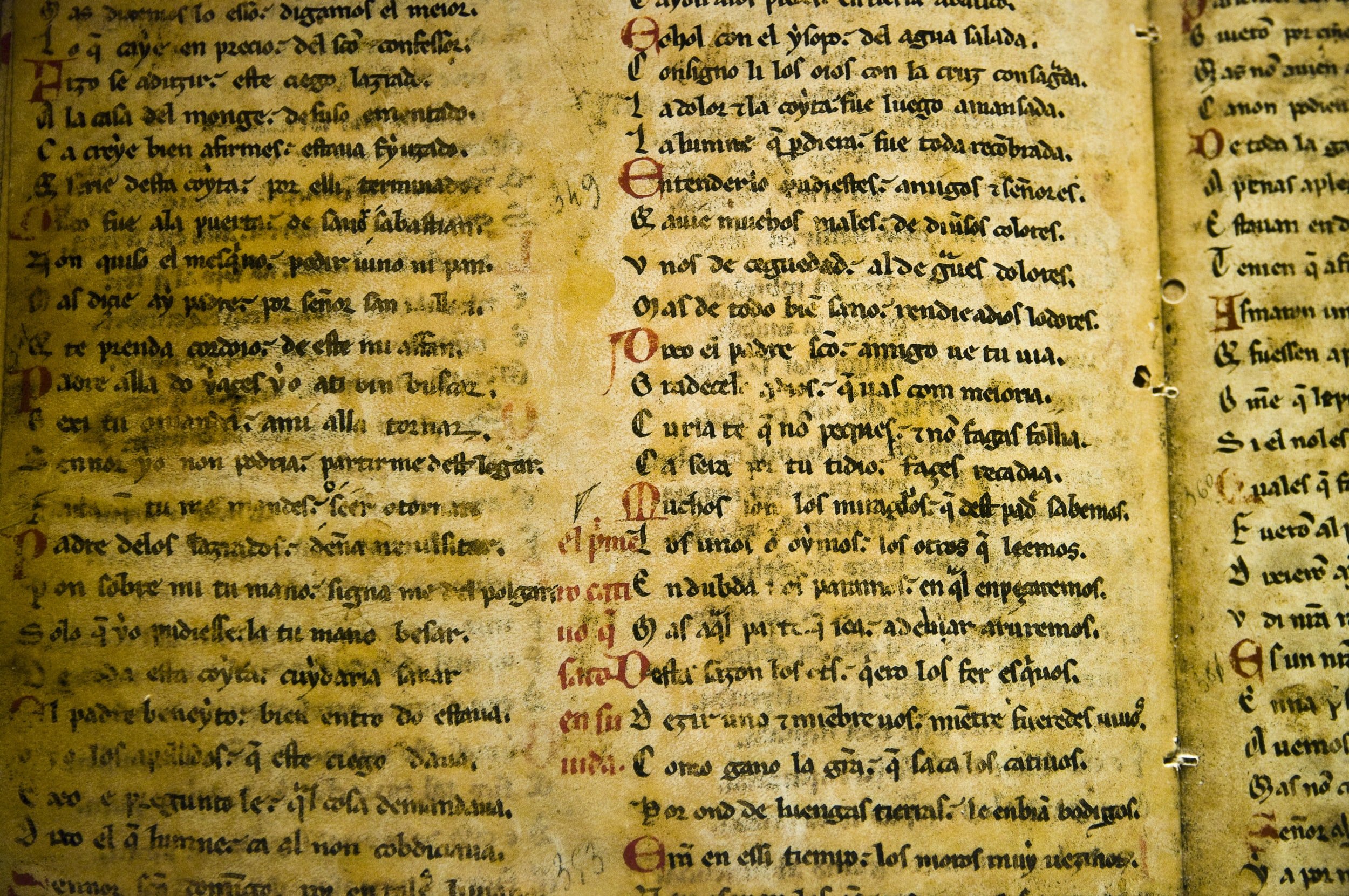I’m excited to get to write for Mad Poets about poetry in translation. If you’ve attended a lot of the First Wednesday readings at the Community Arts Center in Wallingford, you’ll have noticed that translators of poetry (often also poets themselves) present their work from time to time. It’s a task that fascinates me: the verbal texture of a poem is so important, but every language has its own, even languages as close as French and Spanish, or German and Dutch. Every language has things it does better than any other, and you can bet those things wind up in poems. How then can a translator bring the poem into a new language, keeping it a poem instead of a prose retelling?
And yet poetry has exerted huge influence through translation, from Classical Greek or Latin shaping the writing of the Renaissance—or Italian sonnets spurring Elizabethan writing—to the very spare form of haiku flowering in other languages, including American English. Look closely at any big literary movement, and you’ll find translation at its roots.
So I look forward to writing about this.
Pure Gold: A Review of Rumi
Rumi, Gold, translated by Haleh Liza Gafori (New York: New York Review Books, 2022)
Robert Frost famously said that poetry is what gets lost in translation, but that’s true only when it isn’t really a translation, when it’s just a prosy retelling. This book of Rumi’s work brings the poetry home alive. You may never have heard of Jalal ad-Din Mohammad Balkhy (1207-1273), but you have surely heard of Rumi. His famous nickname refers to a regional term for people from Asia Minor, which had until recently been a shrinking part of the Byzantine, formerly Roman, Empire. Rome à Rumi.
I don’t know Farsi, but I’ve read a lot of Rumi in translation. Years ago I visited a friend who was working in a bookstore and reading a lot of Rumi. On her recommendation I went to the R shelf, picked up ten inches or so of Rumi, and gradually read it all over a summer—so nice to read something that isn’t for work, but there’s also the particular pleasure of Rumi, that favorite of spiritual questers. His writings blend humor and fierceness, a Zenlike emptying of the self and a down-to-earth attention to everyday things from everyday life. He is especially treasured by anyone interested in Sufism, a mystical strand of Islam. Rumi is considered a founder of the whirling dervishes (two words that are like their own little poem in English). Some poems in this collection too focus on the ecstatic experience of a spinning dance. The introduction offers more biographical information as well as an overview of Rumi’s impact.
New York Review Books deserve kudos: They publish simple yet beautiful editions from a range of interesting and important authors, nicely translated. Rumi’s single name has joined the list in the back of each of their books. He is important as a poet both for the direct impact of his writing and for his continuing influence on writers and thinkers of all kinds, as his poems spread out into different languages. (Example: bell hooks loved Rumi and spoke about reading him, as a door into Sufism and into joy.)
Earlier translations (judging by the ten inches I made it through) have sometimes been plodding or opaque in places, despite their good intentions; very often they adapted the earlier scholarly translations into English by A.J. Arberry (1961). Not that a prosy Rumi is completely ineffective, but this is so much better. First, Ms Gafori knows Persian (and can consult with family members who are even more fluent), so we can be confident of the accuracy of meaning that a scholar or a spiritual seeker requires. She balances this with literary quality to convey the interwoven aesthetic and spiritual message of this poet, whose intentions and teaching reach readers with their beauty as well as their unexpected turns of meaning.
I had a chance to speak with Ms Gafori, before a recent Zoom event at virtual Main Point Books (hooray!), and learned that she worked on these poems for six years before they were published. It makes sense, then, that they feel complete and finished, “cooked by love’s fire” in the poet’s own phrase. The poems work as poems, in a variety of shapes and tones, often recognizable as ghazals. It’s often haste in the process of moving between languages that loses the poetry, pace Mr. Frost, in an incompletely processed translation.
Here is one simple example (p. 24):
Where the water of life flows,
no illness remains.
In the garden of union,
no thorn remains.
They say there’s a door
between one heart and another.
How can there be a door
where no wall remains?
It feels like a quintessential Rumi poem, simpler than many but with no slag or waste. Reading it in haste means skipping over the important parts—I intentionally chose an example that doesn’t have much literary flash.
The poems are delicious in small bites too: here are a few lines that do have some flash:
“Its hidden smile opens to a laugh that lasts a lifetime” (p. 11)—the repeating l sound links smile and laugh, with the sound repeating three times at the end of the line.
“I am the seed in your beak” (p. 27)—Rumi using a simple image to surprising effect. (Will the seed be cracked or swallowed? Or flown up into the sky, perhaps to fall and sprout in fertile ground?)
“How can I ask how?
Every how drowned in an ocean of no how” (p. 29)—The anglophone reader knows the folksy term “nohow,” and the more standard term “knowhow,” but this is different: it’s “no how,” while nohow and knowhow glimmer behind it as what it is not; knowhow in particular is denied as the speaker sheds prior certainties.
“Armor thinned to a silken scrim” (p. 34)—Notice the way the vowel sounds thin down, too, from open ahr to short i (“thinned,” “silken scrim”), trimmed by the tighter nasal sounds (n, m) and gathering clusters of consonants (lk, scr) on their boundaries. Rumi’s verse is very musical in the original, and the near-rhyme of “thinned” and “scrim” helps recall that.
The word “drunk” occurs many times in the book. A plain and clunky word, completely unpretentious: where it repeats in a poem it might recall dancing heels striking the ground. (The introduction explains the role of wine and drunkenness in Rumi’s path away from official religious status and the complexity in Islam of these references to alcohol.) Elsewhere, the Muse raises a ruckus—a wonderfully down-to-earth word, not one we are used to associating with the Muse.
Ms Gafori points out that Rumi’s language (13th century) feels less old-fashioned in Persian than Shakespeare’s (16th century) does in English. This may be in part because he is so important to the poetic tradition: his centrality keeps him familiar in the ongoing conversation of poetry in Farsi.
There came a moment when one of my students was interested in Rumi, so I gave away my stack of books. Now this slim volume, only 83 pages plus the brief, thoughtful introduction and an index of first lines, offers a delicious selection of his work, and I highly recommend it.
Poet and translator Sibelan Forrester has been hosting the Mad Poets Society's First Wednesday reading series since 2016. She has published translations of fiction, poetry and scholarly prose from Croatian, Russian and Serbian, and has co-translated poetry from Ukrainian; books include a selection of fairy tales about Baba Yaga and a bilingual edition of poetry by Serbian poet Marija Knezevic. She is fascinated by the way translation follows the inspirational paths of the original work. Her own book of poems, Second Hand Fates, was published by Parnilis Media. In her day job, she teaches at Swarthmore College.


